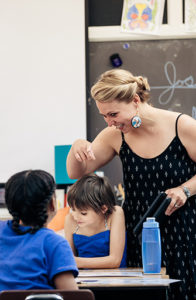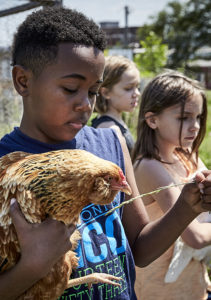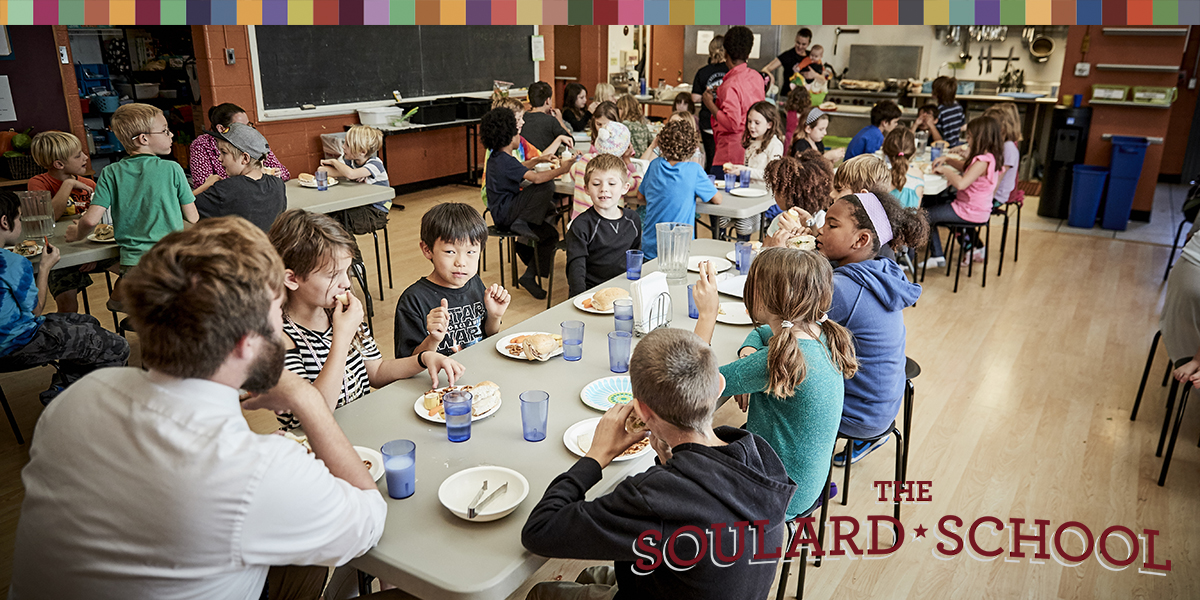“Anyone who does anything to help a child in his life is a hero to me.” ―Fred Rogers
Photo by Paul Nordmann
Students, teachers and parent volunteers of The Soulard School gather together to eat lunch at what they describe as “family style,” just one of many examples of how a sense of community is one of the positive aspects defining this unique south city school.
__________________________________________________
Now imagine a school that focuses on bringing together the surrounding community and providing an education which anyone can access, regardless of demographics or socioeconomics. If you put all of these qualities together, you end up creating a school based on the vision of The Soulard School. “Our mission is to build a warm, welcoming learning environment that serves as an example of the profound and real possibilities of a community dedicated to educating its children, one in which children and adults are encouraged to ask questions and broaden their understanding of themselves, others and the world,” said Sarah Christman, executive director and co-founder of The Soulard School. The Soulard School was originally founded in 2005 by Kelly Holloran and Christman, but its origins went back about eight years prior. According to Christman, the school started out in 1997 as a small Soulard community preschool known as The Little School and Gym. While the preschool was prosperous, many schools in the Soulard area began to close in 2004. “In 2004, several of the St. Louis public schools were losing accreditation,” said Christman. “At the same time, the school board itself would soon be replaced in the next two years by the Special Action Board.” Charter schools were not widespread in the city and several of the schools in the Soulard community ended up closing due to low enrollment. In addition, the local Lutheran school, Trinity Lutheran, announced it was closing and would be merging with another Lutheran school. After all of the school closings, families of the students at The Little School and Gym approached Holloran and Christman and asked them to open an elementary school in the Soulard community so they would not have to move to the county in order to continue providing their children an education as they grew older. “It was a big loss at the time, population-wise, and that’s typically how families were handling it. They would just move to the county since that’s where all the schools were,” said Christman. “But the parents came to us and said, ‘We want to stay here, we want to stay in this neighborhood and we think you should start a school.’” The next step for the school was finding a building. Thankfully the school had a donor who purchased the building in which they currently reside, at 1110 Victor St., but it was not ready for them to use. So they rented space from Trinity Lutheran Church and eventually moved into their new building a bit at a time. The school began rehabbing the new building bit by bit, but their student body began growing in size rather quickly. The school moved into their current location after their second year, in 2007, and by their third year they were utilizing every part of the building. From its beginning, The Soulard School has focused on the social and emotional aspects of child development. In addition, they ensure that students are taught to be good collaborators, strong advocates, strategic problem solvers and effective communicators. “We teach self-regulation and things like that, which are important skills in life. At lunch we sit family style and learn nutrition and manners and how to get along with each other and respectfully disagree with each people,” said Sarah Spencer, a third grade instructor at The Soulard School. “Those are things that when we see graduates of The Soulard School, they take these with them and are pretty well-adjusted people. I think it’s important for them to learn the common-core standards and be proficient in reading and in math, but ultimately you want them to be a good human being and a well-adjusted happy human being. I think they do a really good job of that here.” The Soulard School’s founders, who both come from a strong early childhood background, believe early childhood education means giving students the opportunity to learn about themselves and their interests. In essence, students should have the time and space to spend in the things which captivate them. When people began hearing about the school, “we were called a ‘hippie school’ that just hugged kids all the time,” said Christman. But The Soulard School wanted its students to feel as if they could explore their interests and learn about themselves, something students in a traditional school setting are not always able to do. “I think it’s just an ideal environment for a child to feel that they are able to take risks and be supported,” said Courtney Keefe, STEAM Lab instructor at The Soulard School. “They can come forward with different ideas and they’re able to be heard.” Another aspect that sets the school apart from others is a commitment to knowing their students. The Soulard School asks its teachers to know their students personally and learn about their interests. After learning about those interests, teachers use that information to plan their curriculum for the year accordingly. Teachers are given autonomy to execute everything The Soulard School knows will benefit students. The teachers in every classroom are the ones who decide when and how certain subjects and topics will be introduced to the students. “I love that I have the support of my administrators to really pursue whatever avenues, however crazy or creative they are,” said Keefe. “You feel very safe trying out ideas here and I just think it’s a welcoming space and good learning environment.” While some might view The Soulard School as a private school, the school has worked hard at being inclusive and making sure families of all backgrounds can send their kids to the school. “Because we were in a neighborhood that was lacking schools, we didn’t want it to be, ‘Well, only the families that can pay our maximum tuition can come here,’” said Christman. Instead of offering scholarships, the school decided to implement a sliding-scale tuition system, ensuring every family pays an equal proportion when it comes to tuition. “You are paying what is equal to someone else who might have a $40,000 household income difference than you, but you guys are both paying an equitable amount,” said Christman. Another unique aspect of The Soulard School is its focus on parent involvement. In fact, the parents have helped start several of the school’s programs. “The parents at this school are really involved. Part of the contract you sign when you join the school is that you give 28 hours of volunteer time throughout the year. Every single year, most of the families double, triple, quadruple that,” said Sarah Buckles, a Soulard School parent. “The families are all involved. Even if it’s drop off and pick up, everybody says hi, everybody knows each other, we recognize people.” “I think the parent involvement is the key,” said Buckles. “When you get to know everybody, you value them as a member of your community and we reach out and support each other. I think everyone feels that they’re valued here.” Parent involvement is crucial to The Soulard School’s day-to-day operations. In addition, having the parents involved is important to the development of students at the school. “I remember someone telling me that parents today raise half of the kid and the school raises the other half,” said Lisa Donahue, a Soulard School parent. “But if those two things are separate from each other, how do you raise a whole child?” Overall, the involvement of the parents helps teach students to be involved in the things that are important in life. “I think you have to lead by example. I think if the kids see their parents are involved with their school and their parents are doing the work that makes the school run, the kids see that you’re valuing something and they will as well,” said Buckles. The Soulard School is focused on the idea of a community dedicated to educating the next generation and allowing them to explore the world around them. “It’s what we do with you, not for you,” said Christman. The Soulard School’s story comes from a grassroots call to action. After 13 years, the school has helped fill the need for education in the Soulard community. However, there are still neighborhoods in St. Louis city where there are more children than spots available in their local school. While the schools in the area are slowly coming back, the overall need for schools in the city is still great. “Education in the city is still evolving and has taken a big step forward in recent years,” said Christman. “But The Soulard School will continue to be a pioneer in education.”


